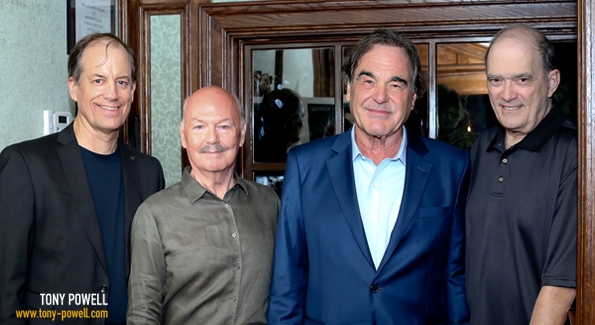Oliver Stone hosts a private screening of “Snowden” followed by a reception in Georgetown.

Thomas Drake, James Bamford, Oliver Stone and William Binney at Chez Billy Sud (Photo by Tony Powell)
Don’t expect to see whistleblower Edward Snowden, currently residing in Moscow, walking on U.S. soil anytime soon. Many believe he deserves a pardon, but based on President Obama’s rejection of his first clemency request in 2014, the odds don’t look good. What we can count on is renewed buzz about the famed dissident surrounding the new feature film “Snowden,” which was recently screened to a private audience at the AMC Theater in Georgetown ahead of its public debut on Sept. 16. The Oliver Stone film has gained national attention as pressure builds for Snowden’s renewed clemency request, heavily supported by human rights groups.
The film is a German-American biographical political thriller directed by Stone and based on the books “The Snowden Files” by Luke Harding and “Time of the Octopus” by Anatoly Kucherena. For those in need of a refresher, Snowden is the former National Security Agency subcontractor who leaked top-secret information about the government’s (NSA-led) domestic surveillance operations that he believed to be unconstitutional. After being charged by the government for violating the Espionage Act, Snowden hopped, skipped and jumped his way from Hong Kong to his current asylum in Russia.
After spending time with Snowden in Moscow and researching his past, Stone told The Hollywood Reporter: “It’s an amazing story. Here’s a young man, 30 years old at that time, and he does something that’s so powerful. He’s a historical figure of great consequence.” Despite his personal fascination with Snowden, Stone had to face the reality that no studio would back such an incendiary film. He stayed the course nonetheless.
Stone hung out at Chez Billy Sud for the packed after-party where Yahoo News investigative reporter Michael Isikoff was overheard having a spirited debate with Stone over the facts of the case. Stone gestured toward Isikoff and said, laughing, “He still believes Lee Harvey Oswald killed Kennedy!”
Amongst the veteran journalists present, there was some further debate about potential factual discrepancies, the main one being whether Snowden actually deleted all the documents in his possession (as the film portrays) before fleeing to Russia.
We chatted with guests to hear what they had to say about the film. Author and lawyer James Bamford, who has written three books about the National Security Agency and spent time with Snowden in Russia for a Wired cover story, said he was “astounded at how close the film came to reality.” Stone, he added, “did an amazing job capturing both the personalities in the agency and the physical details.” Though Bamford was also impressed by lead actor Joseph Gordon-Levitt’s uncanny resemblance to Snowden, he was mostly pleased that the film “allowed the audience to see the personal side of Snowden, and the numerous violations of human rights and civil liberties that led him to become a whistleblower.
Close by was Thomas Drake chatting with Pulitzer-Prize-nominated author Myra MacPherson. Drake is a former NSA executive, a decorated U.S. Air Force and Navy veteran and a whistleblower. He was eventually exonerated for speaking out, but not without bumps in the road, including having his Virginia home ransacked and being terminated from his longtime position at the NSA. Drake is writing a tell-all book about that experience. MacPherson, author of “All Governments Lie” had a mixed takeaway. “My first reaction was spellbinding as I watched the Snowden character slowly evolve.” She was less enamored by the elements of romance, “The love affair,” she complained, “was annoying, without chemistry and went on too long.”
Newsweek’s Jeff Stein said that he found the film both compelling and troubling. In his own published piece he noted that Stone ignored years of back story relating to other whistleblowers and instead “invented a sequence in which a comically evil C.I.A. official, apprehensive about Snowden’s growing disenchantment, lets his erstwhile acolyte know he’s spying on him and his girlfriend.”
Stein thinks that the use of such cinematic devices will likely “re-energize Stone’s persistent, mostly right-wing critics.” The same ones who have criticized his “unconventional portrayals of U.S.-backed Salvadoran death squads, Vietnam atrocities, Wall Street greed and especially the assassination of President John F. Kennedy.”
We couldn’t possibly cover the screening without approaching William Edward Binney, the former NSA intelligence officer turned whistleblower, who was seated discretely in a corner of the party. In 2001, after 30 years of service, Binney resigned from the NSA because he disagreed with its post-9/11 data collection strategy, which he considered unnecessarily threatening to civil liberties and wholly ineffective in preventing further terror attacks. “I’ve been saying from the beginning that the government’s been lying to us about having to trade privacy for security,” he added, “We already had a program running that did that without sacrificing anybody’s privacy.”
Binney believes that the government spends far too much money on acquiring and storing data on U.S. citizens, but that in the end, analysts are rendered ineffective because there is just too much data collected to be be effectively analyzed. He also suggests that such a large permanent collection of data is susceptible to Orwellian abuse as it is more useful in post-hoc political targeting of U.S. citizens than preventing terrorism. “I just hope we get somebody there [in the White House] who will actually do something about it.”
The final question went to Stone: How many Snowdens and Assanges do you think it will take to correct the system?
“It’s going to take a lot of reforms,” he said, “We’re asleep. Congress is asleep.”
This article appeared in the October issue of Washington Life.
View more pictures from the reception HERE
